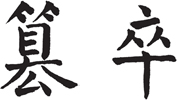5
Selecting the Troops

SUN-TZU SAID:
“For the army, victory lies in selecting the troops; courage lies in the regulations; skill lies in the strategic configuration of power; sharpness lies in trust; power lies in the Tao; wealth lies in a speedy return; strength lies in giving rest to the people; injury lies in frequent battles.”
Sun Pin said: “The implementation of Virtue is the army’s great resource. Trust is the army’s clear reward. One who detests warfare is the army’s true kingly implement. Gaining the masses is the basis for victory.”
Sun Pin said: “There are five factors to constantly being victorious. A commander who obtains the ruler’s sole authority will be victorious. One who knows the Tao will be victorious. One who has gained the masses will be victorious. One whose left and right are in harmony will be victorious. One who analyzes the enemy and estimates the terrain will be victorious.”
Sun Pin said: “There are five factors to constantly not being victorious. A general who is hampered by the ruler will not be victorious. One who does not know the Tao will not be victorious. A perverse general will not be victorious. One who does not use spies will not be victorious. One who fails to gain the masses will not be victorious.”
Sun Pin said: “Victory lies in exhausting trust, making rewards clear, selecting the troops, and taking advantage of the enemy’s weaknesses. This is referred to as King Wu’s treasure.”
Sun Pin said: “One who has not obtained the ruler’s trust does not act as his general.”
Sun Pin said: “Generals have three essential traits. The first is called trust, the second loyalty, the third daring. What loyalty? To the ruler. What trust? In rewards. What daring? To eliminate the bad. If someone is not loyal to the ruler, you cannot risk employing him in the army. One whose rewards are not trusted, the nobles will not regard as Virtuous. One who does not dare eliminate the bad will not be respected by the nobles.”
COMMENTARY
The first paragraph summarizes a number of Sun Pin’s observations on the nature of military affairs, and in particular the essence of the army. The individual principles, which equally draw upon Sun-tzu’s thoughts, are self-explanatory. However, a principle underlying the entire chapter (even though it may have been cobbled together by his disciples) is the fundamental importance of the people.
Warfare in this period imposed increasingly greater burdens on the people, particularly those compelled to serve in the growing infantry, and every wise ruler therefore sought to gain their physical and psychological allegiance, unifying them in outlook and perspective as Suntzu had advised. This would be accomplished by following the Tao, tantamount to imposing a benevolent dictatorship; not interfering with the occupations and seasonal activities of the people; implementing moral policies stressing Virtue; reducing the hardships imposed upon them, such as the corvee labor duties; and eliminating whatever proves harmful. “Gaining the masses” also required minimizing the length and frequency of campaigns by pursuing an enlightened military policy that would allow them adequate rest. Accordingly, Sun Pin is now praised for having opposed frequent and extensive warfare, although he was hardly alone among the military thinkers, all of whom viewed warfare as the greatest affair of state, following Sun-tzu who pointedly condemned prolonged campaigns.
Certain characteristics applicable to all organizations are deemed critical to forging an effective military force: selecting men; imposing regulations and developing strict discipline; fostering trust and certainty, so that commands will be immediately obeyed, and rewards and punishments will be effective; and creating and nurturing internal coherence, unity, and harmony. Moreover, while all human activities are predicated upon them, daring and decisiveness are also required, rather than hesitancy and protraction. Key subordinates and lower level commanders must equally enjoy a full measure of authority, the confidence of their superiors, and support from the troops.
Finally, Sun Pin offers a few observations about the character and qualifications necessary for a commanding general, although not as systematically as in his later chapters or several of the other strategists. While knowledge is obviously critical, the three traits singled out are trust, loyalty, and daring. Virtually every military thinker emphasized courage and some stressed knowledge, but Sun Pin focused upon loyalty by stating, “If someone is not loyal to the ruler, you cannot risk employing him in the army.” In his period of rising military specialization and professionalism, powerful generals posed potentially greater threats to the ruler than a state’s external enemies. Since, to be effective, the commanding general had to be granted unhampered authority over his troops, the temptation to usurp power when triumphantly returning to the capital must have posed serious problems for every political leader. Accordingly, other texts of the period, including the Ssu-ma Fa, offered advice on how to dissipate power and assimilate the troops back into normal, sedentary life. Such problems are not unknown even in the twentieth century, nor among successful subordinates in large enterprises, reluctant to assume a secondary role and lessened prestige after wielding virtually sole power over significant domains, projects, subsidiaries, or overseas branches.